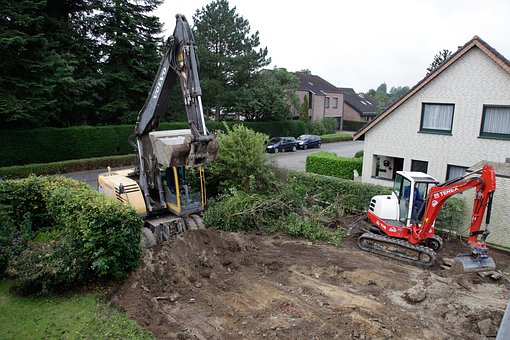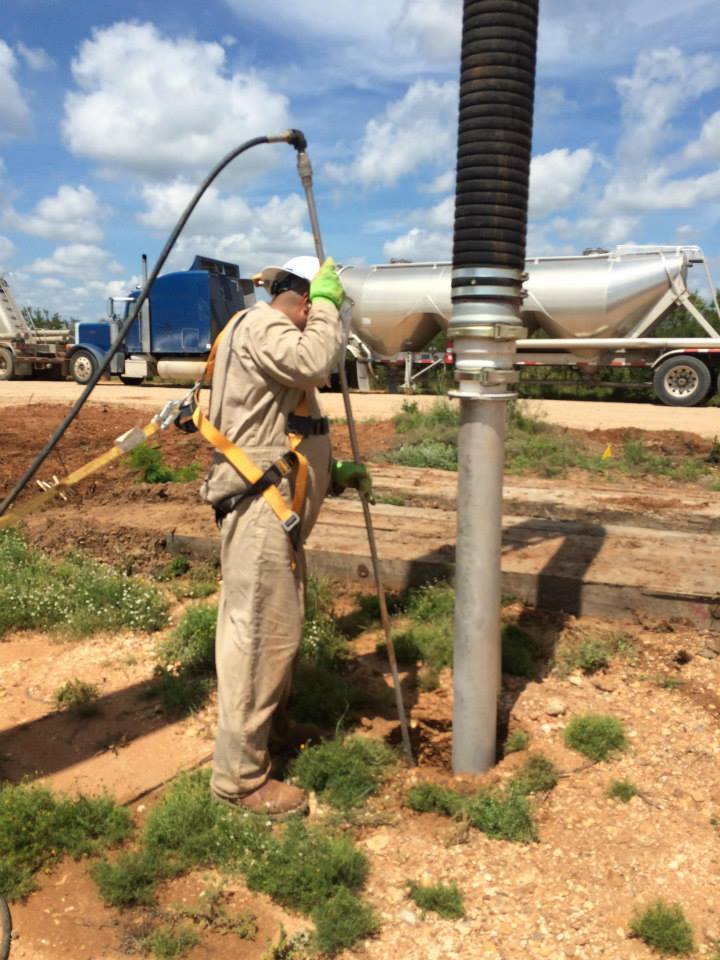The 10-Minute Rule for General Contractor
Wiki Article
Grading Contractors Fundamentals Explained
Table of Contents8 Easy Facts About Demolition ShownThe 6-Second Trick For Excavation CompaniesThe Definitive Guide to DemolitionExcavation Companies for BeginnersThings about Trencher


Scrapers or Pans dig deep into dirt in one area, haul as well as dump the soil in one more spot (excavating contractors). It is hard to match the efficiency of scrapers for cut/fill soil operation if the haul distance is less then a mile. Scrapes are generally pulled by a rubber tire wheel tractor and also are in some cases pushed through the cut area by a bulldozer.
There are often times that scrapes are not used for website grading and also a dump vehicle is used: the haul might be to long, the haul might cross roads where scrapers are not permitted, tough rock may be run into, equipment schedule, and so on. Unload trucks are in usual use as well as probably require little discussion.
"Rock body" beds, on the various other hand, have no tailgates and also can unload any dimension rock, although their volume capability is decreased. Compaction Tools increases the thickness of the dirt and also in some cases provides a smooth, rolled surface area.
What Does Trencher Do?
From a basic examination pit to percussion boring to core boring the proprietor has progressively a lot more pricey choices that generate significantly better information about the site underground. The Owner on a 100,000 SF building task might accredit twenty uninteresting places with split spoon soil samples taken till rock is reached and also then core samples of rock.Recognizing the type as well as quality of rock (from the core samples) and location of rock (from the dirts boring) is a genuine advantage in jobsite planning. Conversely, the Proprietor of a 100,000 SF building might determine to continue with no geotechnical testing whatsoever. The decision about geotechnical screening is typically made by an Owner without any input from the Building Manager.
An understanding of the approximate area of the rock assists the Building and construction Supervisor to intend the sequence of steps adhering to rock excavation. If rock is in one edge of a huge building task, for example, the planet excavation might start at the contrary end of the structure in order to start foundation job soonest.
Beginning the foundation work early would be an excellent concept if the rock can be eliminated by tearing. If the rock is very hard and also calls for substantial blasting, it may be sensible to hold foundation work until the blasting is completed. The Building and construction Manager need to coordinate these types of choices and also use all the technical day readily available.
A Biased View of Excavation Companies
Unclassified excavation states that all rock or other unanticipated materials (omitting unsafe products) experienced in the sitework will certainly be the obligation of the Contractor at no modification in agreement price. An unclassified excavation is less complex from a book-keeping viewpoint and puts the responsibility for geotechnical conditions onto the Sitework Service provider.Exactly How Water Influences Sitework? It's remarkable what a hefty rainfall can do to a building and construction task. Prior to the rain, the site may be completely dry, hefty equipment successfully moving earth, the other professions smoothly doing their job. Within hours the job can be a careless, mud-hole with worker efficiency cut to regarding 10%.
In the majority of areas of the world, the Construction Supervisor need browse around here to remember a basic truth: IT WILL RAIN. Great planning can reduce the damages as well as disruption of a heavy rain to a jobsite. Often the excavation and also grading is entrusted to the Sitework Professional (as well as their Foremen is accountable to supervise and route the heavy devices as well as drivers).
The Building Supervisor need to be constantly conscious of what rain will do to the project website. It is not unusual for the Sitework Supervisor to work their heavy devices for maximum performance and wish it does not rainfall. One of the very best means to plan for rain is to slope all qualities to drain and to smooth rolled the surface prior to a rainfall.
Getting My Concrete Contractors To Work
The Building and construction Manager should be discerning adequate to guarantee that hefty rainfall does not quit job on the task longer than necessary. Daily discussions with Sitework Foremen may be required to achieve this goal. At any time excavation is needed below the existing aquifer on a task, the process of dewatering have to be considered.In a truly cohesive soil, the water travels so slowly through the clay or silt that dewatering is not usually essential for the relatively brief time of excavation. Dewatering may be needed for a solitary ground excavation or for a whole task website. The most common dewatering methods are trench drains, deep wells and well factors.

Ground water seepage can additionally be reduced by cutoff methods such as sheet loading. The prices for dewatering can be incredible, including devices leasing, labor and also power (or gas). High dewatering costs have actually paled the profit margins on far a lot of tasks. The numerous variables listed here make the work of estimating dewatering costs extremely challenging, and also extremely inexact.
This choice needs to always be thought about when evaluating the possibility of dewatering. Obviously the alternative is only feasible if gravity can run the water to reduced ground. Trench drains pipes can be reduced with a backhoe as well as land excavation company loaded with a crude, granular material (# 4 stone for example), however care has to be worked out in picking the water outlet type and location.
Indicators on Trencher You Should Know
A siphon, necessarily, utilizes atmospheric stress to carry water from one elevation, up over a barrier, to a lower altitude. The pipelines in a siphon system should be impermeable and also some ingenuity is frequently called for to entirely fill the siphon pipeline. The siphon pipe have to be full for the siphon to start.A deep well consists of a pump, hose as well as a vertical well casing. The pump consumption is at the bottom of the well housing (generally some crushed rock is put there as a filter tool) (excavation contractors near me). The water is pumped up the pipe, out of the well case, excavator price and to an appropriate discharge place.
In a rugged sand, as an example, a huge area can be pumped to near the pump consumption altitude. A less permeable dirt, on the other hand, decreases the performance of a deep well. Considering that the pump is generally at the bottom of the deep well, there are no elevation limitations because of vacuum lift, and also deep wells can reduce the groundwater over 50 feet.
Under of the wellpoint there is a 2 foot long display and shutoff, water jets out of this shutoff and creates a hole into which the wellpoint pipe can be decreased. This opening is usually made a larger size (for instance 10 inches) to enable a coarse sand backfill to assist filter the water (general contractor).
Report this wiki page